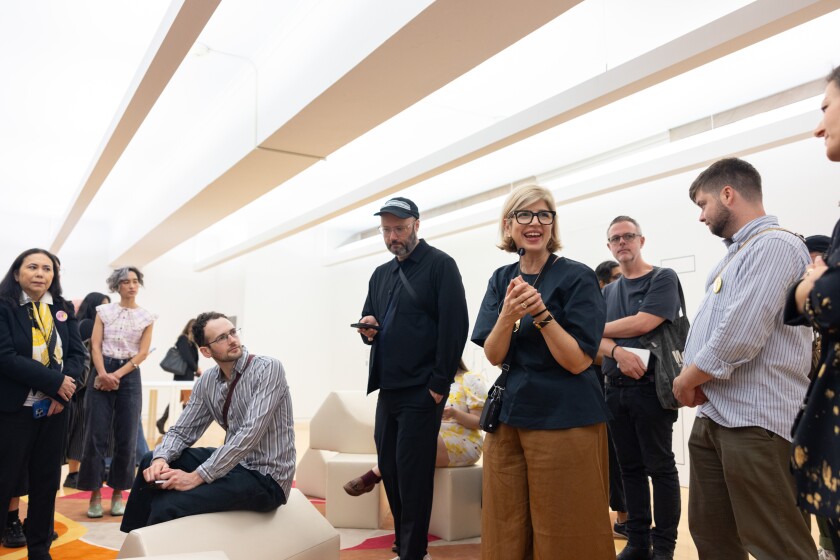Lifestyle
Chicago Architecture Biennial Opens with Focus on Change

The Chicago Architecture Biennial commenced on September 29, 2023, showcasing innovative designs that address the pressing challenges of a rapidly changing world. The theme for this year’s event, “Shift: Architecture in a Time of Radical Change,” is curated by Florencia Rodriguez, the first Latina artistic director of the Biennial, who is also a professor at the University of Illinois at Chicago. The festival will run until February 2024.
In her opening remarks at the Chicago Cultural Center’s Preston Bradley Hall, Rodriguez emphasized the need for architects and designers to reassess their approaches in light of climate change and sustainability. “We all feel that things are changing and we need to regroup and understand what is the world that we want to design and project,” she stated, addressing a gathering of prominent designers and artists.
Exhibitions Highlighting Everyday Impact
The Biennial features the work of over 70 architects, artists, and designers, displayed across various venues including the Cultural Center, the grounds of the Museum of Science and Industry, the Stony Island Arts Bank, and the Graham Foundation for Advanced Studies in the Fine Arts. Notably, all exhibits are accessible to the public free of charge.
A central theme throughout the festival is the focus on designs that resonate with the lives of everyday people. This includes projects aimed at providing sustainable and affordable housing, as well as facilitating social and environmental transformations. Rodriguez highlighted the importance of creating enduring and welcoming spaces that are accessible to all.
Architecture often plays a subconscious role in daily life, influencing how individuals interact with their environments. Rodriguez pointed out that even seemingly simple structures, such as park benches and public space lobbies, embody the essence of architectural design.
Noteworthy Installations and Initiatives
One installation that has generated particular excitement is by artist Jacqueline Kiyomi Gork, featured on the first floor of the Chicago Cultural Center. The piece includes inflatable walls that breathe in sync with symphonic sounds, creating an immersive experience that reflects the dynamic nature of our world. “It’s like the world that we know is inflating and then falling down and then it goes up again,” Rodriguez explained, describing the metaphorical implications of the installation.
For the first time, the Biennial introduces “SHIFT,” a series of projects designed to activate cultural spaces, civic landmarks, and neighborhoods throughout Chicago over a span of five months. A standout piece is “Traces,” an installation featuring 10,000 dry-stacked bricks on the north lawn of the Griffin Museum of Science and Industry. This work pays homage to the 1893 World’s Columbian Exposition, tracing the footprint of the Fair’s historical buildings.
Rodriguez encapsulated the essence of the Biennial, stating, “It’s a festival about the spaces we inhabit, about the built environment, and everyone can come enjoy the art and learn more about the decisions we make.” As the event unfolds, it offers a unique opportunity for attendees to engage with contemporary architecture and its implications for the future.
-

 Lifestyle4 months ago
Lifestyle4 months agoLibraries Challenge Rising E-Book Costs Amid Growing Demand
-

 Sports3 months ago
Sports3 months agoTyreek Hill Responds to Tua Tagovailoa’s Comments on Team Dynamics
-

 Sports3 months ago
Sports3 months agoLiverpool Secures Agreement to Sign Young Striker Will Wright
-

 Lifestyle3 months ago
Lifestyle3 months agoSave Your Split Tomatoes: Expert Tips for Gardeners
-

 Lifestyle3 months ago
Lifestyle3 months agoPrincess Beatrice’s Daughter Athena Joins Siblings at London Parade
-

 World3 months ago
World3 months agoWinter Storms Lash New South Wales with Snow, Flood Risks
-

 Science4 months ago
Science4 months agoTrump Administration Moves to Repeal Key Climate Regulation
-

 Science3 months ago
Science3 months agoSan Francisco Hosts Unique Contest to Identify “Performative Males”
-

 Business4 months ago
Business4 months agoSoFi Technologies Shares Slip 2% Following Insider Stock Sale
-

 Science4 months ago
Science4 months agoNew Tool Reveals Link Between Horse Coat Condition and Parasites
-

 Sports4 months ago
Sports4 months agoElon Musk Sculpture Travels From Utah to Yosemite National Park
-

 Science4 months ago
Science4 months agoNew Study Confirms Humans Transported Stonehenge Bluestones









